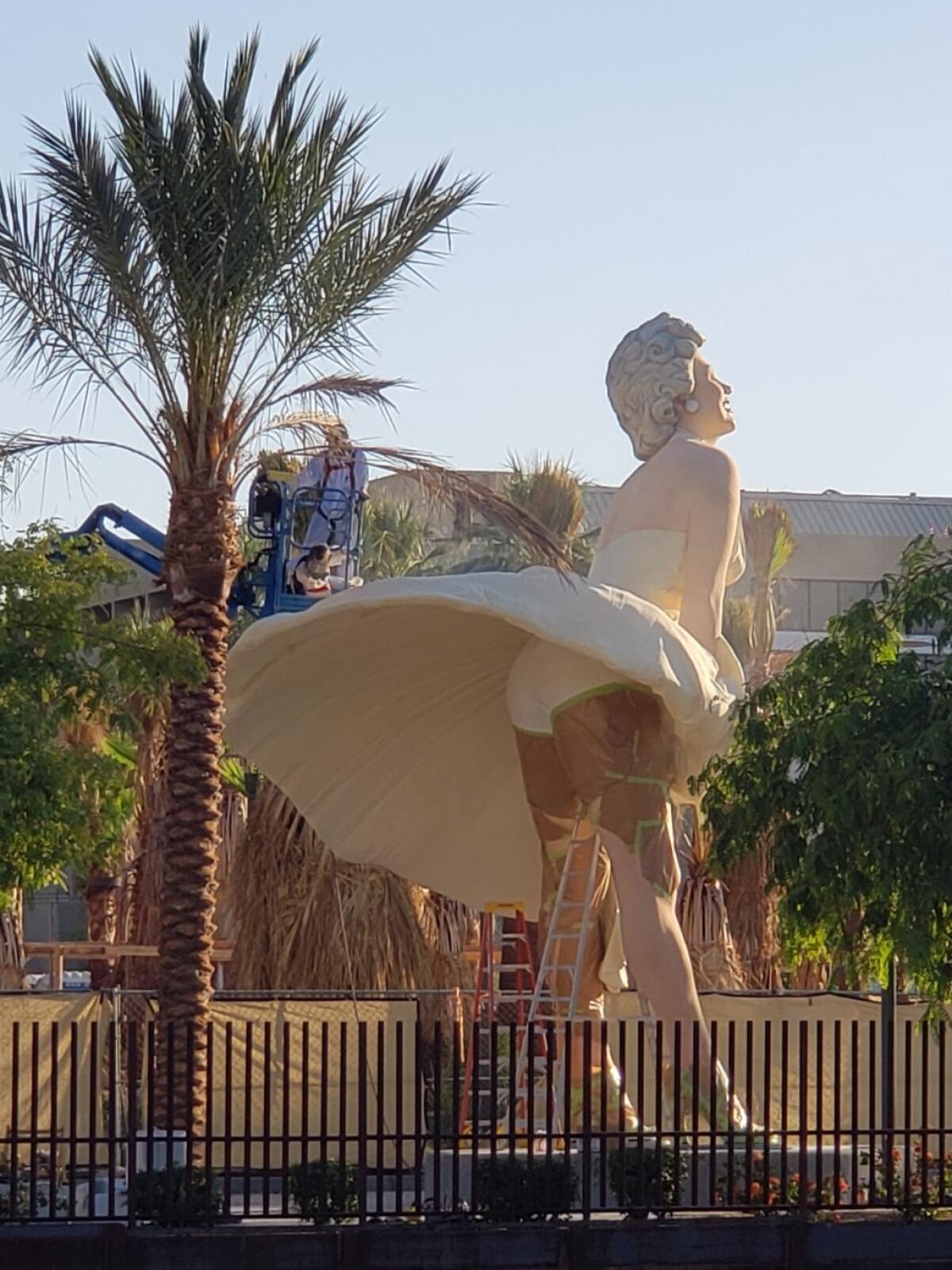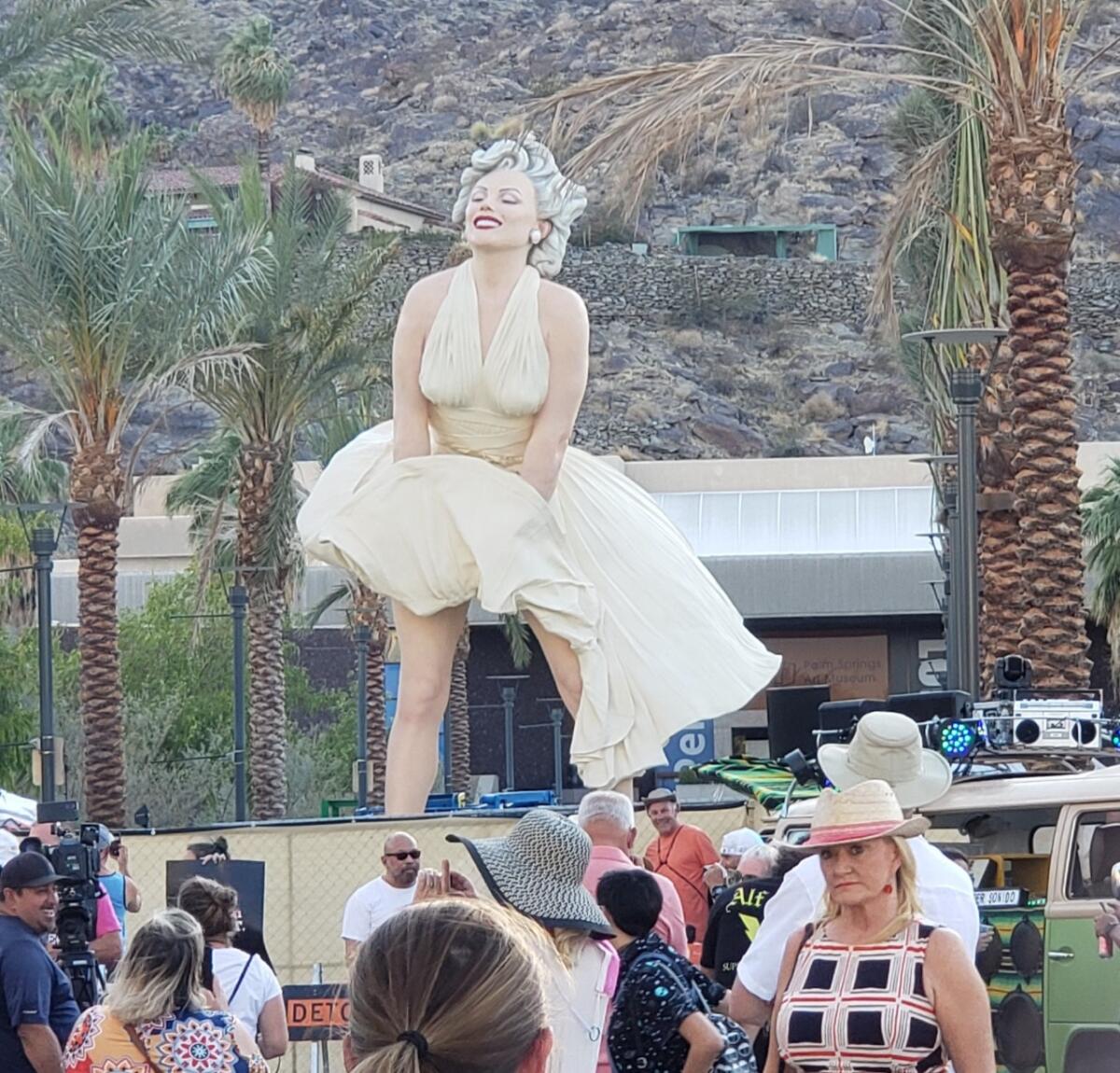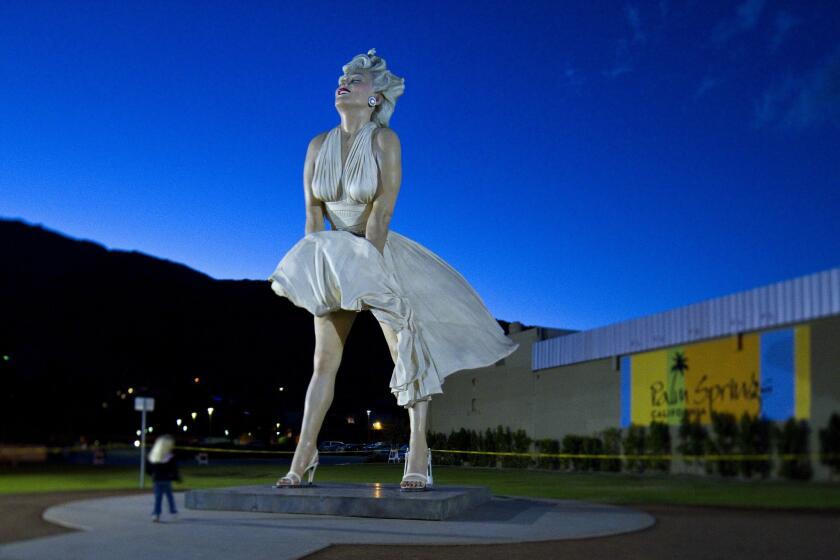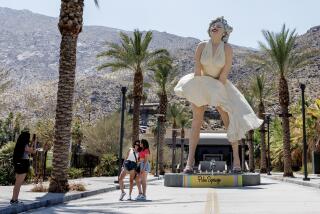Commentary: Marilyn Monroe statue in Palm Springs is an offense to Pride Month

Misogyny is a root cause of homophobia, but a famously LGBTQ-friendly city has just raised a monument to it. The cognitive dissonance of #MeTooMarilyn
Palm Springs is a famously LGBTQ-friendly city, but on Sunday an anti-queer slur was lifted high onto a civic pedestal in one of America’s least likely places.
An enormous, 26-foot-tall painted statue planted in the middle of a downtown street now beckons viewers. The aim is to saunter between a woman’s spread legs, look up her billowing dress and snicker at her panty-clad crotch — or, better yet, snap a photo for posting on social media. With Marilyn Monroe as its doleful model, this adolescent sculptural trash is presented as a welcome draw for desert resort tourism, battered during the COVID-19 pandemic.
A colossal monument to misogyny is awful anytime, but its grand, celebratory unveiling during LGBTQ Pride Month is especially repugnant. Misogyny’s contempt for women is the root of homophobia and transphobia.
An evening launch event featured a deejay, a local TV meteorologist as emcee, booster speeches by city politicians and business representatives and a flyover by a vintage airplane. Fans applauded; protesters booed. Plans to have a fire crew pull off a tarp hiding the statue — the big reveal — were abandoned when time ran out to install the covering.
During the 45-minute program, the name of the artist got no mention. He was no match for movie star legend. “She just loved Palm Springs,” the grandson of Monroe’s photographer-publicist enthused from the podium.

Misogyny is a symptom of self-loathing — internalized hate externalized, in desperate search of someone presumably worse to look down on. Gay men get reviled for the erotic and romantic attachments to men that women commonly express. Gay women get reviled for their indifference to those attachments. And trans people get reviled for the fluidity with which they refuse the static gender hierarchy on which misogyny depends.
For queer people, repairing the deep harm caused by internalized homophobia and transphobia is the reason Pride Month exists. It’s not rocket science: Self-respect — pride — is the opposite of self-loathing.
The statue, titled “Forever Marilyn” but now colloquially re-christened #MeTooMarilyn by the sizable throng of T-shirt-clad protesters at the dedication, was the handiwork of the late New Jersey artist J. Seward Johnson II, scion of the Johnson & Johnson pharmaceutical family. (He died last year at 89.) The thing was created in 2011 and was displayed in Palm Springs from 2012 to 2014 before moving to other cities.
The Palm Springs controversy has fostered lots of distractions, most of them fixated on the life of the iconic movie star, who died in 1962. But Monroe’s story is barely relevant here.
The 21st century part is what matters most. The statue is only 10 years old. The art is contemporary. It speaks in and for the present.
And what it says loud and clear out there on a concrete pedestal in the middle of a public street in 2021 is, “Let’s have some fun and look up this babe’s dress!”
A vulgar, misogynistic statue made by a hack artist will mar Palm Springs’ downtown plan. But how does our art critic really feel?
How offensive is the statue? For one answer just look to press photos of it, which overwhelmingly avoid revealing shots from behind or below. The local Desert Sun ran 36 pictures from Sunday’s event — 36 — and every statue picture is shot from the front. Truthful pictures behind or below would have been distasteful.
The moment the ceremony ended, revelers swarmed close to snap selfies with the statue. Any number featured everything from fingers to tongues pointing up to the exposed crotch.
That smarmy pursuit has next to nothing to do with Monroe’s brilliant achievements as a performing artist, all of which happened 60 to 70 years ago. Johnson’s unctuous frolic, demeaning a woman with more artistic talent in her pinky than in his whole body, has everything to do with misogyny.
A witty cartoon circulating on Facebook provides a sharp and revealing contrast. It shows a burly, bearded man — a bear — fancied up and prancing in curvy platinum wig, billowy dress and spike heels, mimicking Johnson’s statue. The cartoon’s wild exaggerations of big hair, loud makeup, furry bosom and the rest are classic drag — a gay satire on enticements of straight male desire.
Lampooning those who hold the power is fair game. Mocking those who don’t is offensive.
Misogyny is hardly new. Contempt for women has even had a name for 400 years.
The term comes from a Jacobean play, “Swetnam the Woman-Hater Arraigned by Women,” produced at London’s Red Bull Theatre in 1618. The production was part of an anti-feminist controversy that raged for several years, igniting a literary back-and-forth.
The play’s unknown author centers a subplot on a raving bigot named Swetnam, who is fond of traducing women. Forced to flee London civil society disgusted by his crude chauvinism, he ends up hiding out in Sicily under the assumed name Misogynos.
The names are key. Swetnam evokes lowdown piggishness, all sweaty and unsophisticated. Misogynos hides behind an ancient Greek façade of elevated, elegant classicism.
But the charade soon falls apart. Misogynos gets into a public dispute over which gender, male or female, is the more morally obtuse — guess which side he takes? — an argument he loses. Misogyny enters the English language.
Speaking of obtuse, marketing misogyny as a tourist draw ranks right up there.

PS Resorts, the local business group of hoteliers, restaurant owners and others in the city’s crucially important tourism industry, is behind the #MeTooMarilyn debacle. A PS Resorts spokesperson told the Desert Sun the group bought the statue for $1 million, budgeted another $100,000 for installation and expects it to generate many multiples of that expenditure in free social media promotion during a three-year contract with the city.
He’s probably right. Alas.
Not all publicity is good publicity. Palm Springs is now the only city I know that has erected a 21st century monument to misogyny in the center of town, complete with a tone-deaf Pride Month party to celebrate the deed.
Civic support for this fiasco is hugely disappointing. That it’s happening in Palm Springs shows how blindly entrenched misogyny is. Some estimates put the number of queer residents at more than one-third in a population of roughly 48,000, while the entire City Council, including the mayor, is LGBTQ.
Progress in American women’s pursuit of parity certainly persists — ask the new vice president of the United States — but social change always produces anxiety. #MeTooMarilyn drives publicity because it galvanizes constant debates over equality in American life. The obnoxious, demeaning statue offers a reactionary, Swetnam-style response.
The Human Rights Campaign’s Municipal Equality Index, which charts LGBTQ inclusivity in municipal laws, policies and services across the country, rates Palm Springs at 100%. For as long as Johnson’s foul colossus stands tall, HRC might want to consider knocking off a couple points. The desert city’s official endorsement of the root of anti-queer slurs creates clanging cognitive dissonance.
What can you see at the Broad, La Brea Tar Pits Museum, LACMA, California Science Center, Grammy Museum and beyond? Here’s a quick rundown.
More to Read
The biggest entertainment stories
Get our big stories about Hollywood, film, television, music, arts, culture and more right in your inbox as soon as they publish.
You may occasionally receive promotional content from the Los Angeles Times.












